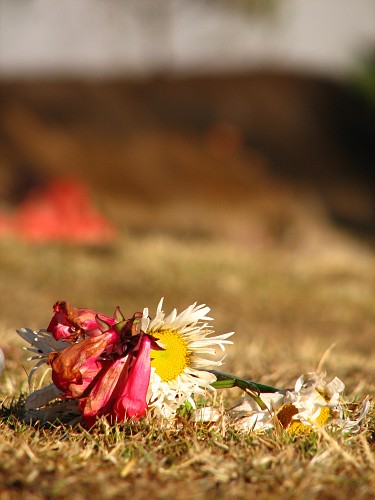Footprint in Peru, Day 6:
a welcome to the house of great mountains
a community service project sponsored by World NomadsAs
we descend into the valley, I can't help but feel like I'm strolling
through a doctor Seuss picture book; it's an awkward but fanciful
arrangement of skinny trees with knobby tops, boulders sprinkled like
bread crumbs from an earth-sized muffin, curlicue streams poured on the
land like molasses, sheep and llamas dressed in perfectly
color-coordinated camouflage, and little dashes of bright red, visible
from infinite distances -- climbing a hill, chasing a goat, tending to
a field or trailing a cluster of other dashing red dots.
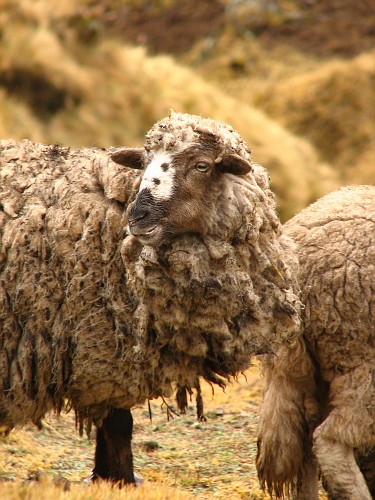
I
don't know what I expected of the Andes, but it is not until my descent
into the valley that I realize my imagination would have been aptly
challenged with the task of a preconceived vision as colorful,
dimensional and whimsical as the one I'm witnessing. In between long
sighs trailed off with adjectives whispered only to myself, Reality
takes a full box of crayons and colors in the black and white image
with which I came.
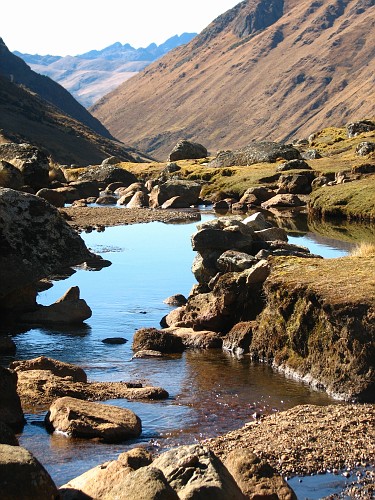
We
arrive at the bottom of the valley where a particularly large cluster
of small red dots has been pulling hair, investigating insects and
poking at old body wounds in the boredom of our long-awaited arrival.
Teachers quickly smarten the little bodies and limbs into erect and
organized lines and set the step for a march towards our group. Each
child is dressed, from hat to toe, in rainbows of home-woven clothing
and accessories. Though each shawl took months of detailed attention by
tremendously patient and skilled hands to create, the children are not
dressed up for this occasion; this is their traditional dress, the same
as what they wore yesterday and will wear, again, tomorrow.
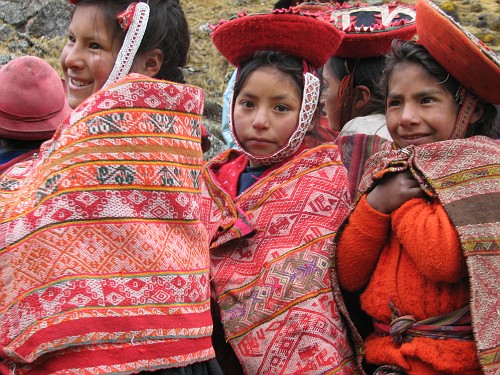
I
am immediately shocked by the familiarity of the rosy
mountain-pass-chapped cheeks and earth-toned and tough skin; apparent
adaptations for those accustomed to living in close(r) quarters with
the sun. I recognize many of their faces as fraternal twins to those
I've encountered in the Himalayas of India, Nepal and Tibet and realize
that they must be siblings in the family of those who have made for
themselves the same home, on different continents, of great mountains.
Each
child in the procession carries a white flower. The flowers were
brought from the lowlands and their drooping faces, which evidence
their exhaust from the distance they traveled, are a comic contrast to
those of the children whose heads are upturned with expressions widened
in excitement and unabashed curiosity.
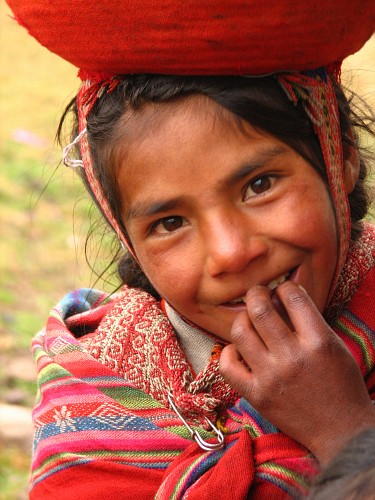
The
teachers urge the children forward and, with this encouragement, one of
the young girls approaches me. When I kneel down to her eye level, she
hands me the flower with one hand, pours confetti on my head with the
other, grins, gives me a quick hug and runs, giggling all the way, back
to her group. Low to the ground, I approach her group and whisper the
question as to if anyone speaks Spanish. They all just bat their huge
black lashes and giggle. I'm sad that I've forgotten my Quechua
phrasebook at home, but will learn later that while these girls don't
speak Spanish, their older sisters do; Spanish being reserved for late
primary school.
As the children continue with the rituals of
their reception, and our initiation, to their village, I decide it to
be the sweetest gesture of the Quelqanqa community; sending in the most
precious of their possessions in life, to make offerings of welcome and
greet us as their guests.
